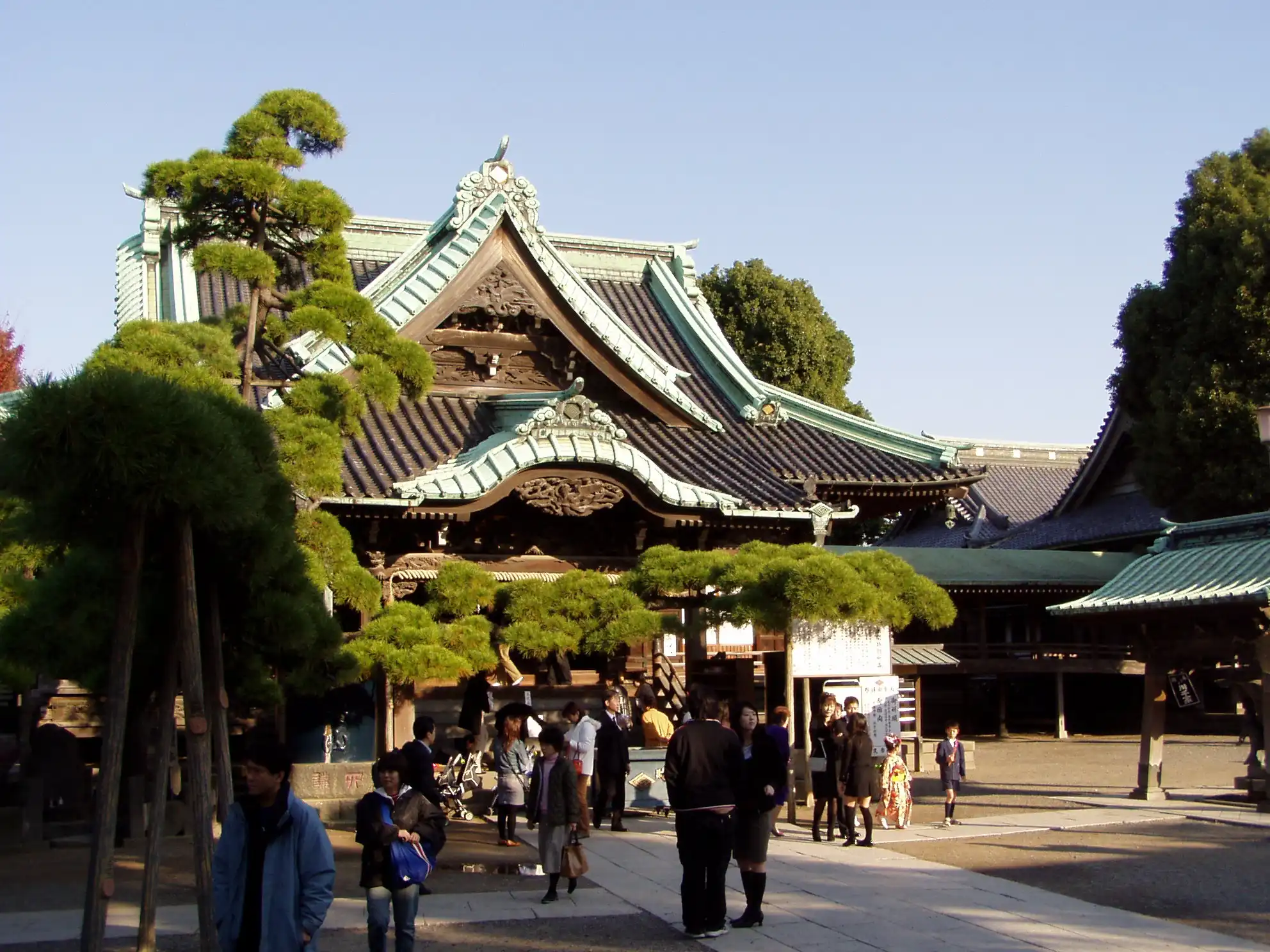
3 Days Itinerary in Katsushika-ku, Japan - Travel Guide
The Katsushika-ku Konnection: Embrace Tradition in Japan within 3 Days
| Days | Description |
|---|---|
| 1 | Day 1 - Arrive and Acclimate in Extraordinary Katsushika-ku |
| 2 | Day 2 - Dive Deep into Katsushika-ku Culture |
| 3 | Day 3 - Bid Farewell to Katsushika-ku |
Introduction
A refreshing and culturally rich 3-day itinerary exploring the traditional district of Katsushika-ku in Tokyo, Japan. From serene temples to local hotpots, prepare to be submerged into the beautiful and awe-inspiring essence of Japanese culture immediately.
Day 1 - Arrive and Acclimate in Extraordinary Katsushika-ku
Welcome to Katsushika-ku, home of Edo culture. Kick-off your exploration with a visit to Tokyo's oldest temple, the Shibamata Taishakuten. This captivating temple, enveloped by intricately carved wooden panels, exudes tranquility beyond words. Let the encounter with spiritual Japan set the mood for the rest of your journey. Post this calming expedition, how about exploring the flavors of local cuisine? Head over to Yokocho street, brimming with small eateries and try the popular 'Monja-yaki'. After a fulfilling meal, a leisurely walk in the picturesque Edogawa Park will reveal the local, more mundane rhythm of Japanese life. Wrap up the day with a soothing Onsen bath at the Somei Yoshino Onsen Sakura. Detox from your long journey and mentally prepare for the adventures yet to come.
Day 2 - Dive Deep into Katsushika-ku Culture
Get ready to experience a slice of authentic Japanese culture. Start your day with a visit to the Yamamoto-Tei; a beautiful traditional Japanese house boasting a stunning Japanese garden. Sip on ceremonial Matcha tea as you take in the serene surroundings. Ready for an even deeper dive into Japanese culture? Next, immerse yourself in the vibrant world of Japanese comics at the Mizuki Shigeru Memorial Hall. Take a mid-day break and savor tasty 'Soba' for lunch at one of the traditional Noodle houses. Post this whimsical lunch, head to the Katsushika Shibamata Tora-san Museum, and get introduced to the beloved character, Tora-san, from the popular film series, 'Otoko wa Tsurai yo'. End your day with a lovely stroll along the banks of the Edogawa River capturing sunset hues.
Day 3 - Bid Farewell to Katsushika-ku
On your final day, visit the Horikiri Shobuen to marvel at the garden's astounding collection of Iris and Azalea flowers. Experience the cultural connect at the Suikei-en, a pottery studio where you could try your hand at making traditional Japanese ceramics. Conclude your journey with a visit to the Kameari Koen neighborhood and indulge in some souvenir shopping. Savor your last day with a delightful ramen bowl at the bustling market street. As the sun sets, allow the magic of Katsushika-ku hold a sacred place in your memories, until you decide to return again!

Andrew Baker
FAQs about this
3 day itinerary in
Katsushika-ku
Spring from March to May, and Autumn from September to November are the best times as the weather is pleasant and the festivals are in full swing. Plus, the gardens are vibrant with seasonal flora!
The local language is Japanese. While English is not commonly spoken, you will find English menus and signages at most places. Also, people are extremely helpful and might use translation apps to communicate.
When visiting temples in Japan, modest clothing is recommended. Avoid wearing sleeveless tops or shorts, and remember to remove your shoes before entering the main hall of the temple.
Other city itineraries in Japan
- Ōakashichō
- Sapporo
- Takasaki
- Toyama
- Hachinohe
- Nishitōkyō
- Bunkyō-ku
- Takatsuki
- Urayasu
- Suginami-ku
- Obihiro
- Numazu
- Kitakyūshū
- Himeji
- Kushiro
- Hadano
- Koriyama
- Sasebo
- Amagasaki
- Kurume
- Kodaira
- Kurashiki
- Toyonaka
- Kita-ku
- Shibuya-ku
- Sakai
- Shinagawa-ku
- Hirosaki
- Matsumoto
- Kōtō-ku
- Kawasaki
- Katsushika-ku
- Kishiwada
- Yokosuka
- Chūō-ku
- Nagaoka
- Ibaraki
- Isesaki
- Miyakonojō
- Ōta-ku
- Odawara
- Ōta
- Saitama
- Higashimurayama
- Jōetsu
- Tachikawa
- Ageoshimo
- Sumida
- Ichikawa
- Ōita
- Anjōmachi
- Tsu
- Aomori
- Kōchi
- Iwata
- Nerima
- Gifu
- Kumamoto
- Chiba
- Tsukuba-kenkyūgakuen-toshi
- Nishinomiya-hama
- Higashi-ōsaka
- Yokohama
- Kagoshima
- Oyama
- Akita
- Kashiwa
- Hitachi-Naka
- Edogawa
- Hitachi
- Uji
- Iwaki
- Nagasaki
- Ōtsu
- Ichihara
- Hachiōji
- Hamamatsu
- Kakogawachō-honmachi
- Yokkaichi
- Ube
- Miyazaki
- Kamakurayama
- Matsuyama
- Noda
- Arakawa
- Shizuoka
- Fuji
- Minato
- Toyokawa
- Izumo
- Yamagata
- Kōfu
- Hiratsuka
- Maebashi
- Tokorozawa
- Chigasaki
- Sōka
- Fuchū
- Hiroshima
- Ichinomiya
- Asahikawa
- Itami
- Nagareyama
- Nagoya
- Tottori
- Ōsaka
- Nishio
- Takamatsu
- Kasukabe
- Kasugai
- Ueda
- Sendai
- Adachi
- Higashi-Hiroshima
- Yato
- Kawashiri
- Daiwanishi
- Toyohashi
- Toyota
- Kumagaya
- Honchō
- Utsunomiya
- Shinozaki
- Nara
- Atsugichō
- Shinjuku
- Fukuyama
- Fukushima
- Fukuoka
- Naha
- Nagano
- Koshigaya
- Sakura
- Saga
- Kariya
- Kyōto
- Fujisawa
- Kukichūō
- Matsudo
- Tochigi
- Taitō
- Mito
- Kanazawa
- Tokyo
- Hino
- Matsue
- Chōfugaoka
- Hakodate
- Ōgaki
- Takaoka
- Niiza
- Machida
- Setagaya
- Toshima
- Tokushima
- Kawagoe
- Itabashi
- Okazaki
- Meguro
- Yamaguchi
- Kamirenjaku
- Nakano
- Matsuzaka
- Fukui
- Wakayama
- Niigata
- Suzuka
- Yachiyo
- Narashino
- Yao
- Minamisuita
- Okayama
- Sagamihara
- Kawaguchi
- Kōbe
- Morioka
- Kure
- Neya
- Takarazuka
- Tomakomai
- Hirakata
